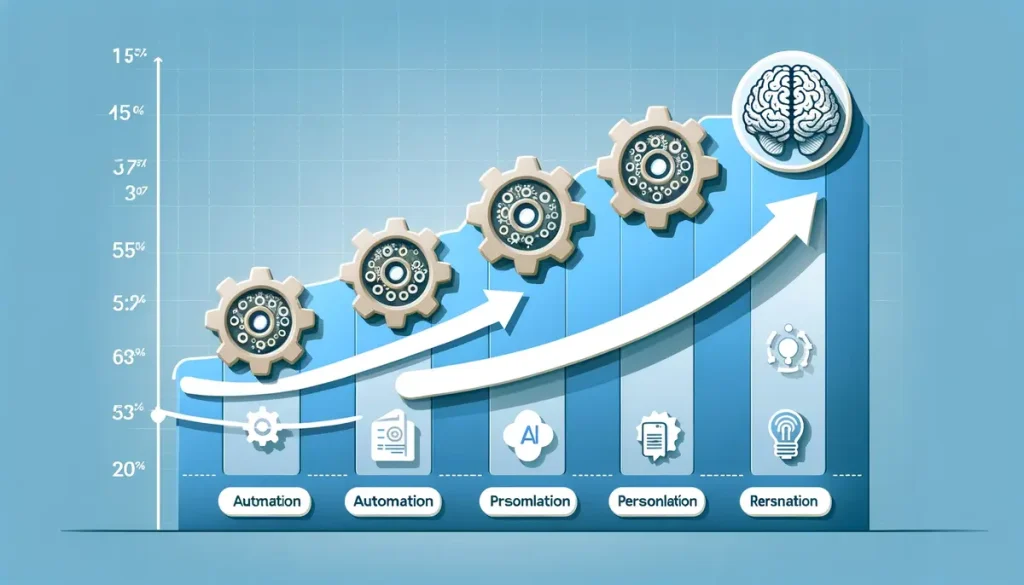The fusion of Artificial Intelligence (AI) and Marketing Automation (MA) is revolutionizing the landscape of digital marketing. As businesses strive for efficiency and personalized customer engagement, these technologies offer unprecedented capabilities to streamline operations and enhance interactions. This exploration will unveil how AI and Marketing Automation are not just tools but transformative elements reshaping the way marketers connect with their audience and drive growth.
Read More: 22 Best AI marketing Tools I’m Using to Get Ahead in 2024
Understanding Artificial Intelligence in the Marketing Domain
Artificial Intelligence, a technology that simulates human intelligence processes by machines, is a cornerstone of innovation across various sectors. In marketing, AI’s impact is profound, transforming traditional strategies into dynamic, results-oriented campaigns. It enables marketers to delve deeper into analytics, enhance campaign creation, and orchestrate multichannel strategies effectively.
AI in Analytics
AI’s role in marketing analytics is indispensable. By analyzing extensive customer data, AI helps marketers unlock new insights and fine-tune their communication strategies. Technologies like Natural Language Processing (NLP) provide a deeper understanding of customer sentiments, facilitating more tailored and timely interactions.
AI in Campaign Creation
From discovering new customer segments to recommending tailored content, AI’s capabilities are vast. Marketers can leverage AI to dynamically adjust campaigns and present the most relevant products to users on eCommerce platforms, enhancing both customer experience and conversion rates.
AI in Campaign Orchestration
AI excels in managing and prioritizing multiple campaigns, making it essential for personalized customer experiences at scale. By determining the ‘next-best-action’, AI enables marketers to deliver targeted campaigns efficiently, maximizing engagement and ROI.
What is Marketing Automation?
Marketing Automation refers to the use of software to execute marketing tasks automatically. This technology streamlines complex marketing processes, allowing marketers to focus on strategy and creativity rather than routine tasks. From scheduling campaigns to executing multi-step marketing journeys, Marketing Automation is integral to modern marketing frameworks.
Streamlining Tasks with Automation
Marketing Automation simplifies the execution of repetitive tasks such as sending emails or posting on social media. By automating these tasks, marketers can ensure consistency and timeliness in their communications, which are critical for maintaining customer engagement.
Multi-Channel Management
An effective Marketing Automation tool does not just automate tasks but also provides a holistic view of multiple channels. This capability allows marketers to synchronize strategies across platforms, ensuring a unified brand message and better customer experiences.
Insights and Reporting
With advanced reporting features, Marketing Automation tools offer insights into campaign performance and customer behaviors. This data is crucial for marketers to refine strategies and make informed decisions to optimize their marketing efforts.
Best Practices with AI and Marketing Automation
Integrating artificial intelligence (AI) with marketing automation can transform how businesses approach their marketing strategies, providing more personalized, efficient, and data-driven campaigns. Here’s a detailed breakdown of best practices for leveraging AI in marketing automation:
Data-Driven Decision Making
- Comprehensive Data Collection: To harness the full power of AI, it’s crucial to gather a wide range of data types from various sources. This includes demographic information, behavioral data, and interaction logs across different channels.
- Advanced Data Analysis: AI tools excel in processing large volumes of data to identify patterns and insights. Using machine learning algorithms, marketers can predict trends and consumer behavior more accurately, leading to more informed decision-making.
- Implementation of Insights: Once insights are gathered, the real challenge is implementing them effectively in marketing strategies. AI can assist in automating this process, ensuring that decisions are quickly reflected in marketing campaigns.
Personalization at Scale
- Predictive Customer Modeling: AI algorithms can analyze past customer behavior to predict future actions. By understanding individual preferences and behaviors, marketers can create highly personalized marketing messages.
- Dynamic Content Delivery: Utilize AI to dynamically adjust the content seen by users based on their behavior or predicted needs. This can include personalized emails, customized website experiences, or targeted ads.
- Automation of Personalized Experiences: Through marketing automation, personalized experiences can be scaled to reach a larger audience without sacrificing the quality or relevance of the message.
Continuous Learning and Adaptation
- Real-time Feedback Loops: AI systems should be set up with real-time feedback loops that allow them to continuously learn from the outcomes of their actions. This helps in refining strategies and making adjustments on the fly.
- A/B Testing: Regular A/B testing, facilitated by AI, can compare different approaches and continuously optimize the marketing efforts based on what performs best.
- Adapting to Consumer Trends: AI tools monitor and adapt to changing consumer trends and preferences, enabling marketers to stay ahead of the curve and remain relevant to their audience.
Ethical Considerations and Compliance
- Privacy and Data Security: When implementing AI in marketing, it’s crucial to adhere to data protection regulations and ethical guidelines to protect consumer privacy.
- Transparent AI Use: Be transparent about the use of AI in marketing efforts, especially how consumer data is used and how decisions are made. This builds trust and fosters a positive relationship with customers.
Integrating with Existing Tools
- Seamless Integration: Ensure that AI solutions integrate seamlessly with existing marketing automation tools to enhance their capabilities without disrupting workflows.
- Training and Support: Provide adequate training and support for marketing teams to leverage AI tools effectively, ensuring they understand both the power and limitations of AI in marketing.
The CRM Marketer Evolution Curve
Understanding the CRM Marketer Evolution Curve enables marketers to strategically enhance their use of technology in customer relationship management. By progressing through these stages, they not only improve their operational efficiency but also create more personalized and engaging customer experiences.
Conclusion
Artificial Intelligence and Marketing Automation are not just trends but essential components of effective marketing strategies. By understanding and implementing these technologies, marketers can drive significant improvements in efficiency, customer engagement, and overall business growth.

